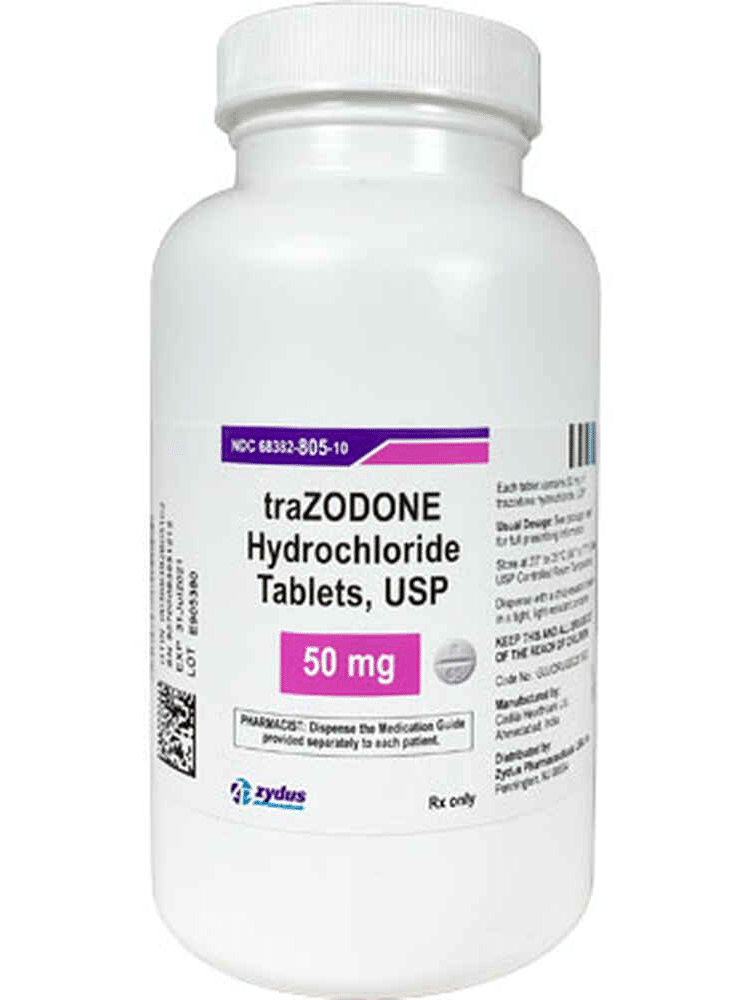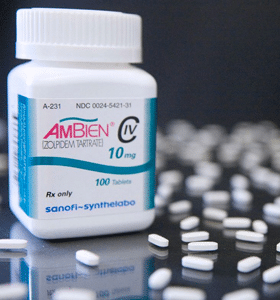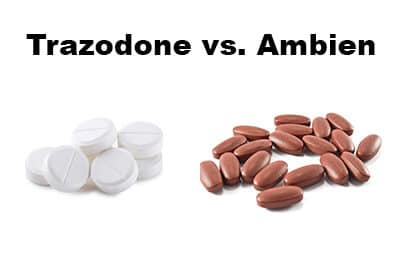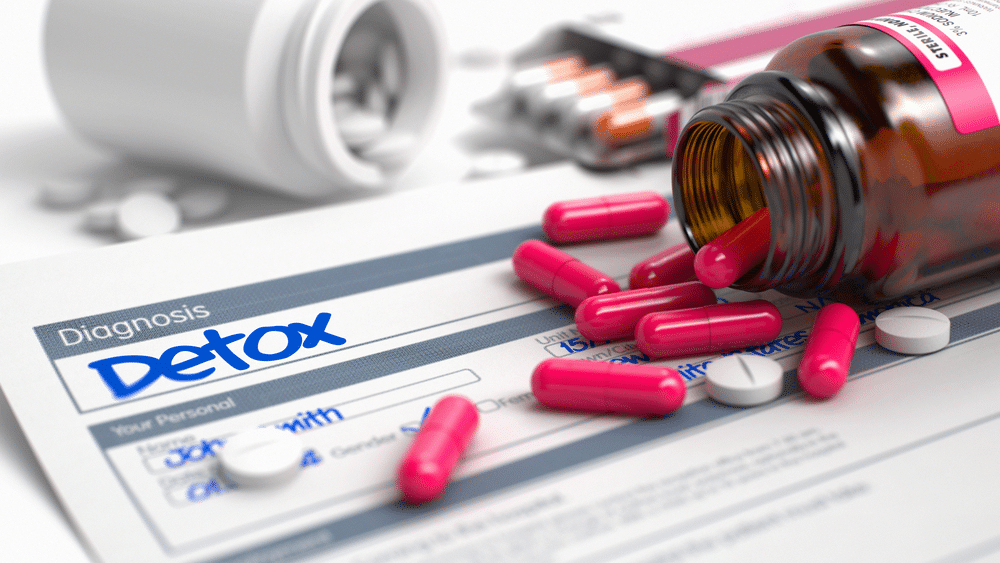Countless people in the world suffer from chronic insomnia, depression, or both. As a result, doctors often give prescription drugs such as trazodone and Ambien to patients. Because doctors often prescribe trazodone and Ambien to patients with insomnia specifically, people often think that these two medications are the same, when in fact, they are quite different. So that you aren’t one of those confused people, we here at Behavioral Health Centers are going to tell you everything you need to know about Trazodone vs Ambien.
What is Trazodone?

Trazodone is a serotonin antagonist reuptake inhibitor (SARI). As a SARI, trazodone prevents neurons from reabsorbing serotonin that’s been released into the central nervous system. This drug interaction with the brain, in turn, causes serotonin to remain in the central nervous system for longer periods.
Because serotonin is a hormone that causes people to feel happy, leaving increased amounts of serotonin in the brain for longer periods can help cure a mental health disorder like depression. Thus, trazodone technically operates as an antidepressant.
Although trazodone operates as an antidepressant, people often compare it to the sleep medication Ambien because of the sedating effects of trazodone. In fact, because trazodone is technically not the most effective antidepressant and the sedating effects of trazodone are so apparent, many people currently use trazodone for sleep than an antidepressant. Since insomnia is a common symptom of depression, it’s not that much of a surprise that an antidepressant such as trazodone can also be effective at treating insomnia.
Overcoming an addiction from substances or alcohol can be a very hard journey, and having a trusted facility and staff by your side is important. Behavioral Health Centers is here to offer all our resources so you can live a happier and healthier life.
What is Ambien?

Ambien is a brand name sedative that doctors prescribe to patients with insomnia to help them sleep. The non-name brand version of Ambien is zolpidem.
Unlike trazodone, Ambien functions as a typical sedative and not as an antidepressant. Ambien works by increasing the amount of gamma-aminobutyric acid (GABA) in the central nervous system. The GABA neurotransmitter is a chemical that reduces the actions of other neurons in the brain, thus causing sedation.
Ambien works quickly and doesn’t stay in the body for a long time. As a result, it can induce sleep with a small dosage. People that have problems staying asleep rather than falling asleep, would need to take a higher dosage of Ambien or an extended-release version of Ambien.
Ambien interacts with a variety of foods, including alcohol. Alcohol drug interactions with ambien may lead to dependence. It is important to talk to your doctor about all potential drug and food interactions before taking Ambien.
Trazodone vs Ambien
One clear similarity between trazodone and Ambien is the fact that people use both medications to treat their insomnia. This is because Ambien is a sedative and trazodone gives off effective sedative effects.
While trazodone and Ambien both help people with insomnia fall and stay asleep, the way that they do so is quite different from one another. This is evident in the fact that trazodone is an antidepressant that increases the amount of serotonin (a feel-good hormone) in the brain.

The sedative effect that trazodone causes is simply a side effect. A side effect that is so strong and effective that many people now use trazodone as a sleep-aid instead of an antidepressant.
Ambien, on the other hand, functions as a typical sleep-aid in that it increases the amount of GABA in the central nervous system. Because GABA reduces the actions of neurons in the brain, increasing the amount of it in the central nervous system causes the human brain and body to slow down and fall asleep. Because the primary function of Ambien is to slow down the action of neurons in the brain, its sedative nature is its primary effect rather than just a side effect like it is with trazodone.
Trazodone vs Ambien as Sleep-Aids
When comparing trazodone and Ambien as sleep-aids specifically, trazodone is cheaper than the generic version of Ambien. Still, both trazodone and Ambien don’t require high doses to treat insomnia.
Trazodone treats insomnia at low doses because it technically isn’t a sedative. Ambien can treat insomnia in low doses because of how quickly it works and the small amount of time that it stays in the human body’s system.
Ambien is particularly effective at helping people fall asleep quickly. To help people stay asleep for longer periods, Ambien has an extended-release version of itself that is also highly effective.
Because trazodone is technically not a sedative, it has fewer side effects when used to treat insomnia than most sleep-aids. Due to its low number of side effects and its ability to treat insomnia at low doses, trazodone is safer for elderly individuals to use as sleep aids than most sedatives.
Downsides of Trazodone vs. Ambien
Like with all medications, there are downsides to taking trazodone or Ambien. For example, the downside of taking trazodone to treat depression is that you’ll have to take a higher dosage of the medication. This is a downside because higher doses mean more side effects. Another downside of trazodone is that it is less sedating than normal sedatives like Ambien and thus, might not be effective for everyone.
A downside to Ambien is that over time, people that take it may also need to take higher doses. This is because people tend to develop a tolerance to Ambien very quickly. As a result, many people that take Ambien need to take more and more of the medication over time.
Other downsides to taking both trazodone and Ambien are the negative side effects that you can develop. For example, people that take trazodone can develop erectile dysfunction and suicidal thoughts. People that take Ambien can develop next-day drowsiness, cognitive problems, parasomnias, and a physical dependency on the medication.
Also, people with a history of depression, respiratory problems, kidney disorders, and liver disorders are not advised to take Ambien due to the negative side effects that it can cause them. To further learn about the side effects of trazodone and Ambien, continue reading.
Side Effects of Trazodone and Ambien
There are many similarities and differences between the side effects of trazodone and Ambien. When it comes to similarities between the two medications, both can cause side effects that are serious enough to need immediate care from a physician.
Because trazodone is technically not a sleep-aid, people with insomnia can usually tolerate the medication more easily than Ambien. Still, with both medications, side effects can be unpredictable. As a result, physicians often like to test and see how their patients initially react to taking either medication before prescribing more.
Other common side effects that can occur when taking trazodone include:
- Vomiting
- Constipation
- Unsteadiness
- Dry mouth
- Fatigue
- Tingling or numbness of arms or legs
- Ringing in ears
- Muscle pain
- Rash
- Tremors
- Shaking
- Anxiety
- Inability to focus and pay attention
- Decreased appetite
- Weight loss
- Prolonged and painful erections
- Suicidal thoughts in young children and adolescents
Other Ambien side effects may include:
- Lethargy
- Drowsiness
- Daytime sleepiness
- Lightheadedness
- Poor reaction times
- Poor coordination
- Poor memory (particularly on the day after consuming the medication)
- Insomnia when discontinuing your use of Ambien
- Hallucinations
Can I Take Ambien with Trazodone?
When Ambien and Trazodone are combined, they can intensify side effects like dizziness, sleepiness, and confusion. This mix may increase fall risk, especially in older people, and cause dependency with prolonged use.
Symptoms of Trazodone Abuse
As mentioned in the list of trazodone side effects, when misused, trazodone use can lead to adverse effects. These adverse effects can be short-term or long-term. The symptoms of trazodone misuse can also vary depending on whether the person misusing the drug is an adult or an adolescent.
Trazodone Misuse Symptoms Amongst Adults
Common symptoms of trazodone misuse amongst adults include:
- Continuously missing work
- A loss of interest in hobbies and activities that you once enjoyed
- Being secretive about whereabouts and actions
- Continuously asking money from close family members and friends
Trazodone Misuse Symptoms Amongst Adolescents
- Always skipping school
- Loss of interest in sports or other activities that the adolescent once enjoyed
- Lack of personal grooming or hygiene
- Lower school performance than normal
- Issues with family members and friends
Long-Term Trazodone Use Symptoms
When trazodone misuse becomes long-term, it can cause a person to develop many symptoms. Some of these symptoms include:
- Memory loss
- Emotional shifts
- Involuntary eye movements
- Foggy brain
- Difficulty speaking to others
- Speaking slowly
- Trazodone overdose
Signs and Symptoms of Trazodone Addiction
While a person can develop an addiction to trazodone, the chances of doing so are much less than with typical sedatives. Still, the people that often misuse trazodone do so for its sedative effects. When a person abuses trazodone so much that it causes physical dependency and changes to one’s brain chemistry, that person has a trazodone addiction.
Signs of Trazodone Addiction
Like with any substance, there are signs and symptoms of trazodone addiction. The most common signs of trazodone addiction include:
- Trying to get more trazodone without a prescription
- Using all of a bottle of trazodone before the medication’s refill date
- Using trazodone with other medications or alcohol to get a higher sensation from different drug interactions
- Going to different doctors and medical clinics to get more trazodone prescriptions
- Buying trazodone illegally
- When trazodone use starts to affect every aspect of a person’s life, such as work, school, and personal responsibilities
- Taking trazodone to get high rather than for depression or insomnia
- Increased trazodone tolerance
- Withdrawal symptoms are present when a person tries to stop using
Signs and Symptoms of Ambien Addiction
People that use Ambien can easily become addicted to the substance over time. This is particularly true if a person misuses Ambien, takes a higher dosage of Ambien than prescribed, or takes Ambien for a longer period of time than prescribed. Common signs and symptoms of Ambien addiction include:
- An inability to sleep without taking Ambien
- Going to multiple doctors to get more Ambien prescriptions
- Spending an excessive amount of time and money trying to get more Ambien
- Trying to cut down on your Ambien use but failing to do so
- Withdrawal symptoms are present when a person tries to stop using
- Continuing to use Ambien despite experiencing dangerous behaviors because of it
- Exhibiting dangerous behaviors due to Ambien use, such as sleep-driving
- Ambien use causing problems at work, school, or home due to you neglecting your responsibilities
Is Taking Trazodone Safer Than Taking Ambien?
Researchers have not performed enough studies on trazodone use for chronic insomnia to determine exactly how safe it is in comparison to other drug sedatives like Ambien. As a result, the exact dose rate that a person should take of trazodone still isn’t technically established. Lower trazodone doses are usually safe though. Hence why doctors often prescribe patients low doses of trazodone.
Trazodone and Ambien Addiction Treatment

To treat trazodone or Ambien addiction, a person should go through four key steps. These steps are assessment, detoxification, treatment, and aftercare.
In the assessment trazodone or Ambien addiction treatment step, you should receive a professional assessment from a physician and addiction treatment specialist to determine what your addiction treatment needs are. It’s also during the assessment stage of trazodone and Ambien addiction treatment that you must check out different treatment facilities and choose one to attend that has the programs and services that you need.
During the detoxification step of trazodone and Ambien addiction treatment, you will gradually allow your body to remove all trazodone and Ambien substances out of your body. During both trazodone and Ambien detox, you’ll experience withdrawal symptoms.
During the treatment step of both trazodone and Ambien addiction treatment, you’ll take part in various addiction treatment programs and therapy group sessions. It’s key to receive social support from your addiction treatment specialists, therapists, and fellow recovering trazodone and Ambien addicts when attending rehab for either one of those two substances. You can attend both trazodone and Ambien rehab through a residential treatment program or some type of outpatient treatment program depending on the severity of your addiction.
During the aftercare step of both trazodone and Ambien addiction treatment, you can receive help through support groups, continued counseling, or life at a sober living community. Participating in aftercare addiction treatment will help you transition back into the real world more smoothly. Receiving aftercare addiction treatment also lowers the chances of you relapsing.
Behavioral Health Centers is Here to Help You Treat Your Addictions
Behavioral Health Centers is a multi-facility rehab center that treats all types of substance use disorders. That’s why we provide our patients with high-quality addiction treatment programs and resources. Thus, whether you’re looking to attend addiction treatment for trazodone and Ambien misuse or the misuse of some other substance, we’ve got residential and outpatient addiction treatment programs that you can use.
To learn more about Behavioral Health Centers and the addiction treatment programs that we offer, contact us today. We’re more than willing to answer any questions that you may have.
Get Help Today
Don’t go through the process of recovery alone. There are people who can help you with the struggle you’re facing. Get in touch with one today.
Recent Posts

How Does Alcoholism Run in Families?
How does alcoholism run in families? Alcoholism, or alcohol use disorder (AUD), is a chronic disease that significantly impacts many

The Three Phases of Alcoholism
Alcoholism, a chronic disease characterized by the inability to control or stop drinking alcohol despite adverse social, occupational, or health

Understanding Inpatient vs. Outpatient Mental Health Treatment: What’s Best for You?
Choosing the right mental health treatment option is pivotal for anyone embarking on their mental health journey. The difference between





